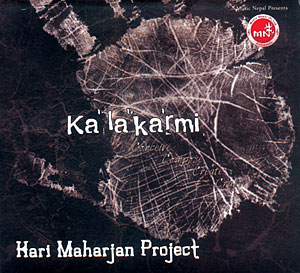 Album: Kalakarmi Artist: Hari Maharjan Project Distributor: Music Nepal Price: Rs 300 |
Confession, first off. Even before laying my hands on Kalakarmi, I'd declared on numerous occasions that Hari Maharjan is 'the best guitarist in Nepal'. So even if a whole succession of Thamel music shops seemed bemused by my request for the Hari Maharjan Project's debut album ("Ko? Naamai sunyaa chaina..."), I expected much.
I wasn't disappointed. And you don't have to be a bedroom guitarist to lock into Kalakarmi, either. Along with Rizu Tuladhar (bass), Daniel Rasaily (drums/percussion) and Nawaraj Gurung (tabla), Hari has created a sound that fuses and transcends the genres he draws on, and promises to grant him international critical acclaim, if not fame and fortune.
Those accustomed to Hari's pyrotechnics on the electric guitar at live venues across town may have expected more obvious fireworks, and simply listening to Kalakarmi they may also miss the visibly dynamic synergy of Rizu and Daniel, an essential component of the trio that plays live on Hari Maharjan Project (HMP). But they are missing the point. Hari's inspired, clean-toned, jazz-rock riffs, alternately elongated and shredded to perfection, are spread over nine instrumental tracks that reward repeated listening.
The most accessible tracks on Kalakarmi are already a staple of HMP's live performances. Never gonna drink and drive again and Soul in you are simply phenomenal world-class tunes. Both boast amazing, complex sets of crunchy, funky riffs, and you may well find yourself humming the unorthodox melodies the day after. Bass and percussion are in perfect sync here, with Hari surfing the beats. But it's not all spacey, funky jazz. There are Shakti-esque moments in both Big Brother and the title track Kalakarmi, and the galloping Chyante Ghoda evokes Mustang in more ways than one.
Throughout, while remaining essentially a jazz album, Kalakarmi showcases HMP's fluency in rock, blues and funk. What sets their debut apart from a host of high-minded modern jazz fusion is the uncontrived, organic nature of the compositions, which are laced through with mostly subtle references to Nepali musical cultures. The beautiful melody in Raktika, for instance, brings one in mind of a nursery rhyme � or is it a Newari tune?
Kalakarmi is an unabashedly serious debut. It won't gain HMP the flag-waving devotion his former bandmates in Nepathya enjoy, not least because it's wholly instrumental and, well, jazz. If you like a rousing chorus, Kalakarmi might seem like an exercise in guitar noodling. But the very fact that it's accessible to non-Nepali speakers sparks hope that with robust marketing and further experimentation with other sounds and artists across Nepal, HMP may well become the first Nepali band to truly represent us on the global stage.
Rabi Thapa
READ ALSO:
Model Dhulikhel, RUBEENA MAHATO
Solving mysterious fevers, DHANVANTARI by BUDDHA BASNYAT, MD
Collecting rain


